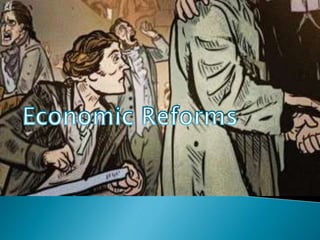
Presention for history 2
- 2. All the deputies believed in laissez faire. The aim was to open up a range of crafts and occupations to more people. They had restricted the entry of people who had less privileges regarding employment. In October 1790 internal tariffs were abolished , so a national market was created for the first time.
- 3. In November 1789 it was announced that church property would be sold to benefit the state. •Many nobles had fled before the revolution broke and their properties were confiscated and sold. Overall, the peasants paid less and since exemptions had been removed , a more just system had been created. However poverty remained.
- 4. There were no free trade which meant that there was state regulations, trolls and price controls. •The church had provided what little assistance the poor had received from its lands and its main source of income such as tithes. •The estates of the realm (First, Second and Third estates) was abolished and replaced with equality. •Work was given to you for your skills and not purchased. •The third estate felt the king disregarded relief for the poor as a duty of the state.
- 5. Their aims were to get rid of any organisations which had special privileges and restrictions regarding employment. It was also to stabilize Germany’s economy by ending unfair taxes on the less privilege and abolishing the estates of the realm, this gives everyone a chance . To limit the kings power
- 6. Getting rid of the estates the assembly enabled more equality. Internal tariffs were abolished, so a national market was created. Goods could the move freely. The economy benefited from free trade. There were more price controls.
- 7. The assembly set up a committee which, in 1791, showed for the first time which showed just how serious the problem was. There was simply not enough money available to deal with such an appalling problem, so nothing was done. It concluded that nearly two million people could support themselves only by begging. However, not all reforms changed to the better. The church had provided what little assistance the poor had received but it could no longer do so when its land was sold and it lost its main source of income.
- 8. Some of the features of the new system were: In every canton there was a going to be a justice of peace which will deal with cases previously handled by seigniorial courts. A criminal courts would be found in each department, trials would be held in public before a jury. The idea of having a jury was taken from the English law. In every All judges were elected by active citizens but only those who had been lawyers for 5 years were allowed. This ensured that all the judges were well qualified and accountable. The lettres de cachet was replaced by a uniform system with a justice of the piece in which canton and a criminal court with trial by jury in each department.
- 9. The system didn't’t have a fair way of judging crimes. Lettres de cachet was present meaning the King had unlimited power. There were no elected judges by active citizens. This never ensured that all judges were well qualified and accountable. What are the aims: A new system was put in place simply to limit the kings power. The idea of having a jury that represents justice and peace was taken from English laws. In what ways were they an improvement: The penal code was made humane: torture and mutilation were abolished. The number of capital crimes was reduced. It replaced all other forms used on those condemned to death.